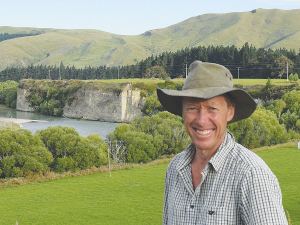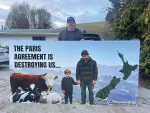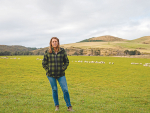OPINION: There are sound reasons why emissions taxing NZ food producers is not just a bad idea for farmers and food prices but also bad for the environment, the climate and our country.
Per unit of food produced, New Zealand is among the world's most emissions efficient. If our food producers can remain at the top for emissions efficiency, the more food they produce, the better for reining in global warming while still feeding a growing human population. Instead of penalising the world's most efficient food producers, surely for the good of global climate change, New Zealand producers should be encouraged to maintain, or even increase, their food production. This would let those who are less-emissions efficient, improve their practices or change land use, giving greater benefits to mitigate climate change.
New Zealand is a remarkable story. Our food producers are some of the least subsidised in the world operating from a pin-prick island nation thousands of kilometres from our markets. Yet we can still put our food on supermarket shelves across the globe as the most emissions-efficient food in the world. We should all be incredibly proud of this achievement (Jacinda and James, take note).
The Government's analysis shows that emissions taxing out food producers could lead to a 20% reduction in sheep and beef and 6% drop in dairy production. Why would a government reduce the production of the world's most emissions efficient produced food? We are told we must do this (tax our food producers) to achieve NZ's climate change reduction targets.
Not only is this selfish - solely focusing on our targets while reducing emissions efficient food production and increasing global warming - it is also contrary to the Paris Agreement food security aspirations, as well as being economic suicide. It is this same short term, flawed, silo thinking that is leading to carbon forestry offsets taking over our farms.
Now, think of your nearest small town anywhere in NZ. Mine is Cheviot, heartland sheep and beef hill country farming in North Canterbury. Typical small town - supermarket, school, pub, couple cafes, retail shops, medical centre, and many small rural businesses servicing over 150 farms. Based on the average cost per farm, the emissions tax proposed by the Government could take $1 million out of our community in the first year alone, increasing each year after that.
Add to that increasing compliance and costs, multiple unworkable regulations (national policies that are impractical, cost prohibitive or won't work) and the outcome will be devastating for thousands of rural communities. Less farmer spend will mean businesses like our environmental work will vanish overnight. The tax farmers must pay is the equivalent of 1 - 2 years environmental spend. The environment will be worse off.
Already, traditional farming families with generations of environmental ethos are exiting the industry as carbon forests move in. The trend will accelerate if the emissions tax comes in.
The main reason we are told we must do this (emissions tax our food producers) is because overseas markets are demanding it. Are they really demanding all the outcomes detailed above? I think not. Are they really wanting us to reduce the production of the world's most emissions efficient produced food? Again, no. Are they wanting us to focus on our own climate change targets if it means global emissions increase? NO!
The Government is using this reason of overseas markets because there is no rational explanation for taxing our world leading food producing farmers.
Groundswell NZ's position is clear: we oppose an emissions tax on NZ food producers. We are not against change or the need to address environmental issues.
We believe NZ should aspire to remain world leaders of environmentally sustainable and emissions efficient produced food. The focus should be on best practice actions on-farm integrated across all environmental issues (emissions, water quality, biodiversity) and not a blunt tax that increases food prices, increases global warming, destroys rural communities and is worse for our environment and country.
Jamie McFadden is Groundswell NZ's environmental spokesperson.



















